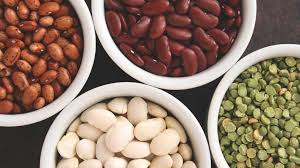Beans are seeds from the Fabaceae family, commonly known as the legume, pea, or bean family. They are an affordable source of protein, fiber, and vitamins that offer many health benefits.
They usually grow in pods, which are capsules with several beans inside. These pods or capsules develop from flowers. Other legumes include peas, peanuts, and lentils.
In this article, we are going to learn about the nine health benefits of beans, including getting more protein and reducing the risk of heart disease.
The 9 Different type of beans include:
There are about 9 different types of beans which include the following:
1) Lima beans
2) Black beans
3) Black-eyed peas
4) Soybeans
5) Kidney beans
6) Garbanzo beans
7) Navy beans
8) Pinto beans
9) Red beans
4 Health Benefits of Beans

There are so many health benefits of eating beans and below are the major 4 amazing health benefits of beans:
(1) Protein source
Adding beans to grains can turn an incomplete protein into a complete one. Protein is a vital nutrient that plays a key role in virtually everything the body does. Beans are high in amino acids, the building blocks of protein.
Protein sources can be divided into two different categories: complete and incomplete. Animal products, soy, and quinoa are all complete proteins, which means they contain all nine amino acids.
Out of all the types of beans, only soybeans contain all nine amino acids. Incomplete proteins can be easily combined with nuts, seeds, dairy, or grains at a single meal or over various meals throughout the day to make complete proteins.
For example, a person can eat beans with rice or couscous. Even having black beans at lunch and then almonds or cheese later in the day can ensure people get complete proteins.
Beans make an excellent source of protein for vegetarians and vegans. They are also lower in calories and saturated fat than some other protein sources, such as dairy products.
Read Also: Methods of Drying, Storing and Handling Dry Edible Beans
(2) Nutrient Dense Food

Beans contain several vital nutrients, including folate. Folate can help prevent neural tube defects in a fetus during pregnancy. Dried beans contain nearly double the folate that canned beans contain, so it is better to cook them from their dried form. However, canned beans still contain more folate than many foods.
Not getting enough folate can cause several symptoms, including: weakness, fatigue, heart palpitations, loss of appetite, irritability. Other important nutrients found in beans include: Zinc, Iron, Magnesium and fiber.
(3) Antioxidant

Beans are rich in a type of antioxidant called polyphenols. Antioxidants fight the effects of free radicals, which are chemicals that affect a wide range of processes in the body, from physical aging to cancer and inflammation.
(4) Better heart health
People who consume beans may be less likely to die of a heart attack, stroke, or other cardiovascular health problem. A 2013 analysis of previous studies found a clear correlation between eating beans and a reduced risk of coronary heart disease. Other research suggests that beans may lower cholesterol. High cholesterol is a risk factor for heart disease and heart attacks.
Read Also: The Different Types of Manure and How they Work
Do you have any questions, suggestions, or contributions? If so, please feel free to use the comment box below to share your thoughts. We also encourage you to kindly share this information with others who might benefit from it. Since we can’t reach everyone at once, we truly appreciate your help in spreading the word. Thank you so much for your support and for sharing!
Frequently Asked Questions
We will update this section soon.

